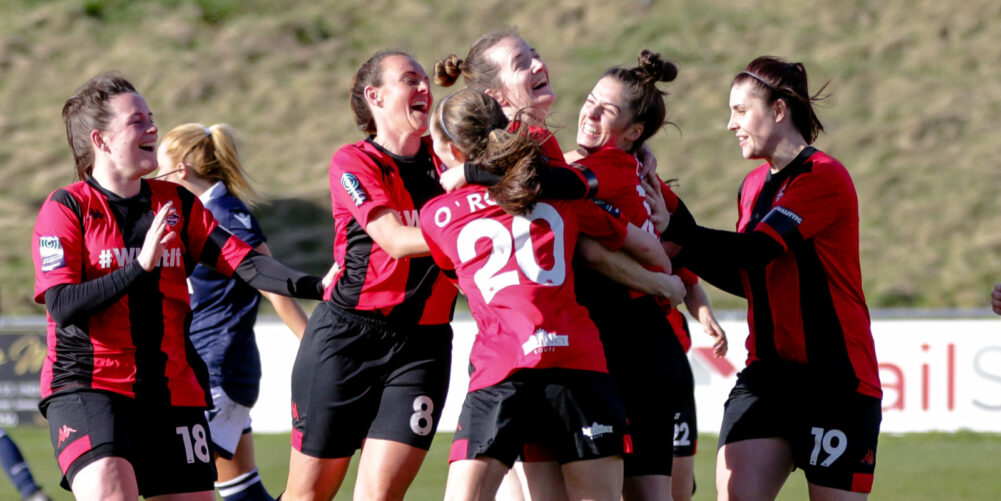Ten point three million people tuned in to watch England’s World Cup semi-final against USA.
That average audience figure – it peaked at 11.7m – is staggering and shows the desire to watch women’s football in this country.
Audiences rapidly rose through the tournament as the Lionesses gripped the nation before heartbreaking defeat at the hands of the superior Americans.
Of course there is disappointment they couldn’t get to the final – and for many that was the yardstick having reached the last four in their previous two tournaments. But there is no doubting there is an appetite for it in this country and now is the time to keep the momentum going.
Why does this matter to Non-League clubs? They too can play an important role in developing the game, for the betterment of girls and women and also their own club.
While the focus for most has always been on the men’s first team and their game on a Saturday at 3pm, more and more are seeing the value of having women’s and girls’ football at their club.
It is vital to that community and inclusive feel. We all see youngsters watching Non-League games so surely everyone should have a team to aspire for.
Football clubs are in a powerful position to shape and mould future generations in this country – boys and girls.
The shining example are Lewes. The Sussex club pay the players in their men’s and women’s team the same and chairman Stuart Fuller believes this World Cup has been a watershed for the women’s game. The conversation around it has changed, people who have never watched a game before are now tuning in and the players are becoming household names.
“The amount of people I know that have never seen a women’s game but have watched the football – this has been a tipping point for the game,” Fuller says.
“From our own situation, we can see that crowds have gone up in three years from, not quite one man and his dog, but 60 and two dogs. We averaged 640 last year for the women’s and 670 for the men.
“It did help on the women’s side that we did have Man United and Spurs – they were two big draws – but even if we exclude those, the core support has gone up nearly eight-fold in three years.
“There’s a lot of crossover as well. The people who are traditionally the men’s team fans, are now coming to the women’s games too.”
Lewes play the FA Women’s Championship, the second tier of the game below the FA Women’s Super League.
Some clubs might say building a women’s team is an expenditure they can ill-afford. Resources are stretched as it is, both time and money, just trying to keep the men’s team going.
But Lewes – with their Equality FC – are clearly showing what can be achieved and others could follow, even if it’s on a smaller scale.
“When we started down this road there were people who questioned it and said it would be to the detriment of the men’s team,” Fuller says.
“Well, the first season we launched the Equality FC, we topped the Isthmian South for 33 weeks of the season and only lost out on the title in the last week – we still got promoted and it was the first promotion the men’s side has got in ten years. So is there any correlation that we’ve done Equality, which means the level of professionalism off the pitch has changed?
“Last year, for want of a centre forward, we probably would have been in the play-offs again. This season we’re going in and it’s really positive. We’ve got a couple of decent sponsors we hope to announce soon and it’s looking really good.
“If there’s clubs out there thinking, ‘We’re not too sure it’s for us’. Honestly, it’s one of the best things we ever did.
“I don’t think you could ever get to a situation in our lifetimes where you’re going to have the type of equality just because of the 50-year headstart the men’s game has had, but I look around and there are clubs with women’s teams and roughly at the same level of us and they could say, ‘We’ll pay our players the same’. It’s a no-brainer. The amount of attention, media and publicity they could get and would really help them is there to see.”
Lewes, like for their men’s team, place huge emphasis on the matchday experience. Go to the Dripping Pan for a women’s game and there will be a different feel.
“We’ve tried the stereotypes and, actually, they don’t work,” Fuller says. “‘Ooh, we’ll set up a jewellery shop in one of our beach huts or we’ll offer a nail bar’. Didn’t work. It’s about the experience. Putting slightly different food on, offering Prosecco and gin at the bar, whereas on a men’s game we don’t do that. All those little things have helped build an audience and build a following.”
Opportunities in football on offer to girls are ever growing in this country. Do well and the experiences could be quite incredible thanks to the large investment and professionalism that has been introduced.
Lewes are growing their girls’ academy for next season, have an U15s, U16s and an U18s side in addition to their first and reserve teams as they open up a pathway for aspiring footballers.
Fuller expects there to be a knock-on effect from the World Cup but knows the importance of the next steps being well-thought out to ensure the potential is maximised. It’s certainly there to be realised.























